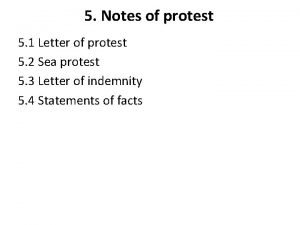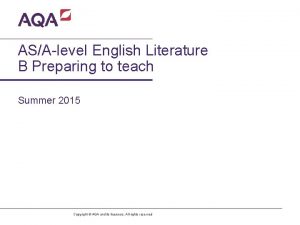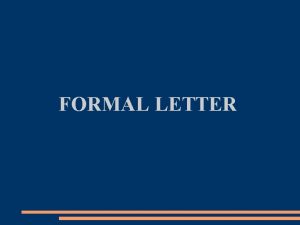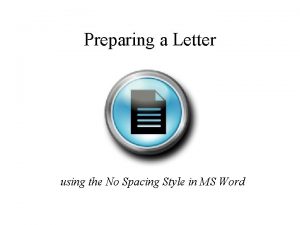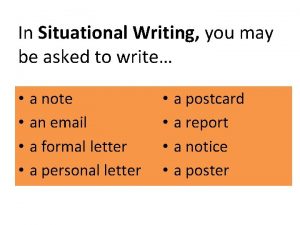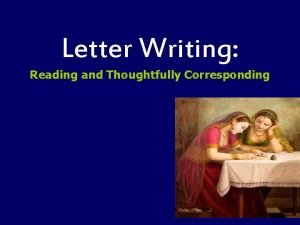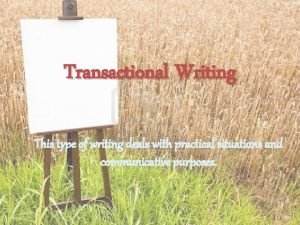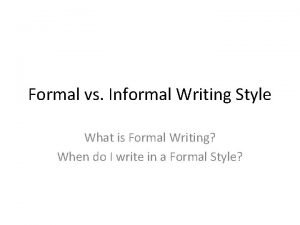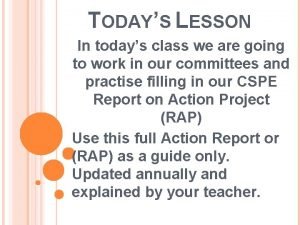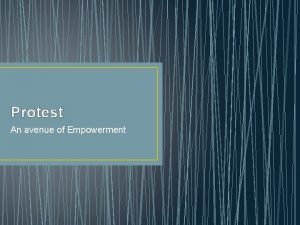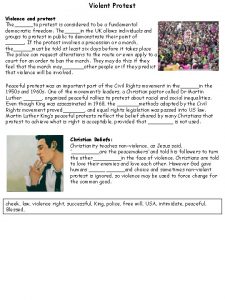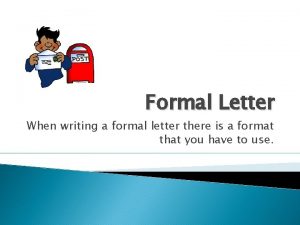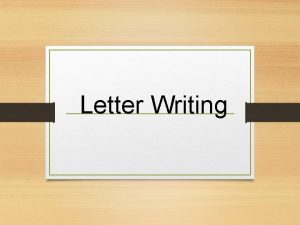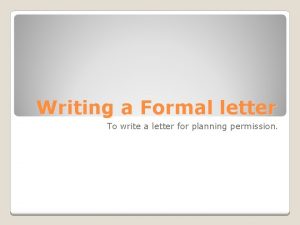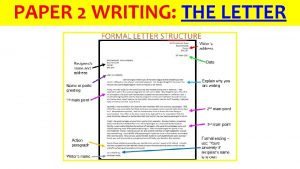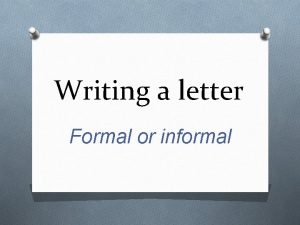Writing a formal letter of protest For todays

















- Slides: 17

Writing a formal letter of protest

For today's class you will need student's book: Solutions Upperintermediate, pages 44 -45

Formal letter Think of a situation that would make you protest (e. g. the school principal decided to forbid gatherings in the schoolyard during the breaks) How would you start your letter? What would you write to make a strong point? How would you describe negative effects? How would you end your letter?

Example of a formal letter • read the letter on page 44 in your student's book How do we start and end the letter if we do not know the name of the person we are writing to? (page 44, task 1)

Now answer the questions. (page 44, task 2) What is the council planning to do, and when? How many objections does June raise in her letter? How do many students currently use the library? How will the closure affect elderly and less affluent people? How else do people use the library, apart from to borrow books? What action does June request?

Find and underline in the letter nine phrases from the list below (page 44, task 3) Useful phrases for a letter of protest opening the letter • I am writing to protest against … • I wish to register my opposition to … • I am writing to express my concern about … introducing your reasons for protesting • I am very worried about/that … • I am particularly concerned about … • I fear that (it) will lead to … It is clearly unfair to/that … • In addition …/Furthermore … making a point forcefully • It is important to recognise that … • The fact is that … • What you don’t seem to realise is that … describing ill effects • … will do serious damage to … • … will lead to the collapse/destruction/death etc. of … • … is bound to adversely affect … • The consequences of … will be very damaging … • requesting action • It is for these reasons that I think… • Please put a(n immediate) stop to … • Please do everything in your power to …

Add one of these phrases to each group in exercise 3 (page 44, task 4) a It is/I find it unacceptable that … 1 opening the letter _____ b I would like to point out that … 2 introducing your reasons for protesting _______ c I wish to object in the strongest possible terms to … d I urge you therefore to reconsider your decision/proposal (to …) e … will have a devastating effect on … 3 making a point forcefully ______ 4 describing ill effects ______ 5 requesting action _____

Complete the Exam tip. Find the features in the letter. Check you understand the key features of formal letters EXAM TIP • Put _____at the top on the right, _____ address just below on the left and _____ below that. • Start and end the letter correctly: Dear _____ or Madam / name … Yours faithfully / _____. • Avoid _____ language and _____ , direct questions and _____ marks. • At the end, sign your _____ , then print it underneath.

Describe the photo. Do you or your family ever shop at out-of- town retail parks? Why? /Why not? (page 45, task 1)

Read the newspaper article. Answer the questions. (page 45, task 2) 1 What does the council have to decide? 2 Who is paying for the new retail park? 3 How big will it be and how much will it cost? 4 What two possible advantages of the plans are mentioned in the text? 5 What two possible disadvantages are mentioned?

Read the task below. How many paragraphs will your letter have? (task 3, page 45) • Write a letter of protest (200– 250 words) to Councillor Nesbit at Aylesmarsh Council. Include the following points: • State that you object to the proposal to build the new retail park. • Give two objections, with reasons. • Say what action you would like the council to take.

Plan and write your first paragraph, stating clearly what you are writing about (i. e. that you object to the proposal). Use phrases from task 3 on page 44 and slide 6. (task 4, page 45) Now choose two reasons for objecting to the proposed retail park from the list below, or think of your own ideas. Expand the two ideas and make notes. (task 5, page 45) objections Possible • effect on shops/loss of jobs in the town centre • increased traffic • destruction of a beautiful rural area • effect on wildlife

Write the second and third paragraphs of your letter, using the notes you made in task 5. Use phrases from task 3 on page 44. (task 6, page 45) Now decide what action you would like the council to take. Choose ideas from the list or think of your own. Expand the ideas and write notes. (task 7, Possible actions page 45) • • find an alternative location abandon the proposal hold an enquiry and consult local traders build new shops and a car park in the town centre

Write the fourth paragraph of your letter, using the notes you made in task 7. Use phrases from task 3 on page 44. CHECK YOUR WORK Have you: • structured your letter following the task 3? • included some phrases in each section from page 44? • used a polite, formal style? • used the correct layout and language to start and finish your letter? • written 200– 250 words? • checked your spelling and grammar?

Revision: DOs and DON’Ts when writing a formal letter • start by saying why you are writing or what you are responding to • use paragraphs to keep the letter clear and easy to understand • get to the point • keep it brief • use standard phrases • open your e-mail with • • informal salutations like Hi or Hello write about irrelevant issues use contractions, abbreviations (coz, uni) use emoticons use slang, profanity, jokes


Izvor: Solutions Upper-intermediate, OUP • Prezentaciju izradili: • Matej Kunštek, student 5 godine engleskog jezika i književnosti • Mentor: Dunja Frković, prof. savjetnik
 Letter of protest sample
Letter of protest sample Aqa a level english literature b poetry anthology
Aqa a level english literature b poetry anthology Formal response to invitation
Formal response to invitation Formal letter structure
Formal letter structure Formal business letter spacing
Formal business letter spacing Situational writing formal letter
Situational writing formal letter Complaint letter tone
Complaint letter tone Objectives of teaching letter writing
Objectives of teaching letter writing Letter writing objectives
Letter writing objectives Formal letter writing format
Formal letter writing format Examples of transactional writing
Examples of transactional writing Sky root grass letters
Sky root grass letters Example of formal writing and informal writing
Example of formal writing and informal writing Informal style of writing
Informal style of writing Difference between academic writing and technical writing
Difference between academic writing and technical writing Format of friendly letter
Format of friendly letter Generations
Generations In today's class
In today's class
